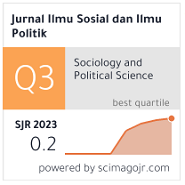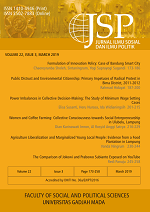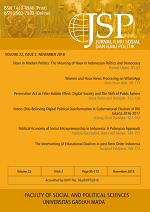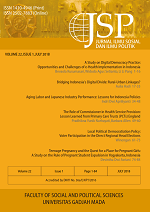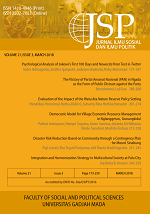Quasi-Alliance at Play: The Curious Case of South Korea’s Aborted Withdrawal from GSOMIA in 2019
Resi Qurrata Aini(1*), Yandry Kurniawan(2)
(1) Department of International Relations, FISIP, Universitas Indonesia, Indonesia
(2) Department of International Relations, FISIP, Universitas Indonesia, Indonesia
(*) Corresponding Author
Abstract
This study aims to explain why countries maintain security cooperation with a partner even though they are in the middle of severe tensions. This is experienced by the Republic of Korea (ROK), which preferred to maintain its security cooperation with Japan under the General Security of Military Information Agreement (GSOMIA). This research utilizes the concept of abandonment fears to explain South Korea's behavior in reversing its self-declared withdrawal from GSOMIA in 2019. By conducting a deductive-qualitative research approach, this research shows that South Korea was in a position of abandonment fears—fears of being ignored by Japan—magnified by the uncertainty of US commitment. For now, South Korea considers Japan as the most likely partner choice in the region. Thus, Seoul decided to maintain the partnership with Japan within the GSOMIA framework and compromise its grievances with the latter.
Keywords
Full Text:
PDFReferences
Alghifari, F., & Letticia. (2016). Analisis Teori Offense-Defense terhadap Reformasi Kebijakan Pertahanan Jepang dalam Dinamika Keamanan di Asia Timur. Global: Jurnal Politik Internasional, 18(1), 18-33. doi:10.7454/global.v18i1.45
Arif, M. (2016). How Threat Assessment Could Become Self-Fulfilling Prophecy: Case of U.S-China Relation. Global: Jurnal Politik Internasional, 18(2), 120-130. doi:10.7454/ global.v18i2.140
Baldwin, D. A. (1971). Thinking about Threats. The Journal of Conflict Resolution, 15(1), 71-78.
bbc.com. (2018, 29th of November). Mitsubishi Heavy ordered to compensate forced S Korean war workers. BBC. Retrieved from https://www.bbc.com/news/ business-46381207
Bisley, N. (2020). Security Policy in Asia from Obama to Trump: Autopilot, neglect, or worse? In O. Turner & I. Parmar (Eds.), The United States in the Indo-Pacific: Obama's Legacy and the Trump Transition (pp. 161-176). Manchester: Manchester University Press.
Bong, Y. D. (2016). The U.S.-South Korea Alliance: Local, Regional, and Global Dimensions. Asian Politics & Policy, 8(1), 39–49. doi: https://doi.org/10.1111/aspp.12242
Bryman, A. (2004). Social Research Methods (2nd ed.). Oxford: Oxford University Press.
Cha, V. (2000). Abandonment, Entrapment, and Neoclassical Realism in Asia: The United States, Japan, and Korea. International Studies Quarterly, 44(2), 261-291.
Chun, C.-S. (2000). Theoretical Approaches to Alliance: Implications on the R.O.K.-U.S. Alliance. Journal of International and Area Studies, 7(2), 71-88. doi:http://www.jstor. com/stable/43111426
Chung-in, M. (1991). The Political Economy of Defense Industrialization in South Korea: Contraints, Oopportunities, and Prospects. The Journal of East Asian Affairs, 5(2), 438-465. Retrieved from http://www. jstor.com/stable/23253549
Cohen, R. (1978). T hreat Perc eptio n in International Crisis. Political Science Quarterly, 93(1), 93-107.
Darussalam, M. F. (2020). The Influence of Domestic Politics of South Korea on its Relations with North Korea and the United States. Jurnal Ilmu Sosial dan Ilmu Politik, 23(3), 250-261. doi:10.22146/ jsp.48652
Eun-Mi, C. (2010). Memory Politics and International Relations in East Asia-Focusing on “Past Problem” between South Korea and Japan. International Area Review, 13(2), 63-79.
Far Eastern Economic Review. (1966). Far Eastern Economic Review, LIII(8).
Hayashi, H. (2008). Disputes in Japan over the Japanese Military "Comfort Women" System and Its Perception in History. The Annals of the American Academy of Political and Social Science, 617, 123-132. Retrieved from https://www.jstor.org/ stable/25098017
Hornung, J. W. (2018). Success with North Korea Still Needs Japan. RAND - Commentaries.
Hurst, D. (2019, 19th of March). Japan Takes Small Step Toward Diplomacy With North Korea. The Diplomat. Retrieved from https://thediplomat.com/2019/03/japan-takes-small-step-toward-diplomacy-with- north-korea/
Japan Press Weekly. (2018, 28th November ). Korean top court orders Mitsubishi Heavy Industries to pay damages to wartime forced laborers. Japan Press Weekly. Retrieved from https://www. japan-press.co.jp/s/news/?id=11887
Kim, A. (2020). Understanding Japan–South Korea Cooperation and Friction Through Neoclassical Realist Theory. Jadavpur Journal of International Relations, 24(I), 28-52.
Kim, C., & Kim, C. (2017, 17th of August). South Korea's Moon Says North Korean Nuclear- Tipped ICBM is a 'Red Line'. Jakarta Globe. Retrieved from https://jakartaglobe.id/ news/south-koreas-moon-says-north- korean-nuclear-tipped-icbm-red-line/
Kim, J. Y. (2014). Escaping the Vicious Cycle: Symbolic Politics and History Disputes Between South Korea and Japan. Asian Perspective, 38(1), 31-60. Retrieved from https://www.jstor.org/stable/42704853
Kim, M., Parker, S. L., & Cho, J. Y. (2006). Increasing Distrust of the USA in South Korea. International Political Science Review, 27(4), 427-445.
Ko, S. K. (1972). South Korean-Japanese Relations since the 1965 Normalization Pacts. Modern Asian Studies, 6(1), 49-61. Retrieved from https://www.jstor.org/ stable/311986
Korostelina, K. V. (2017). The normative function of national historical narratives: South Korean perceptions of relations with Japan. National Identities, 1-19. doi:10.1080/14608944.2017.1401599
Lamont, C. (2015). Research Methods in International Relations. London: Sage Publicatios Ltd.
Lee, J. (2018, 28th of November ). Korea's Huge Bet on Semiconductor Exports Adds Risks to Economy. Bloomberg. Retrieved from https://www.bloomberg.com/news/ articles/2018-11-27/korea-s-huge-bet-on- semiconductor-exports-adds-risks-to- economy
Lee, M. C. (Producer ). (2019). The Strategic Value of the General Security of Military Information Agreement. Retrieved from https://www.defenceiq.com/cyber- defence-and-security/articles/the-value- of-the-general-security-of-military-information-agreement-gsomia
Manyin, M. E., Chanlett-Avery, E., & Williams, B. R. (2019). South Korea: Background and U.S. Relations. Retrieved from
Manyin, M. E., Chanlett-Avery, E., & Williams, B. R. (2021). South Korea: Background and U.S. Relations (IF10165). Retrieved from United States: https://fas.org/sgp/crs/row/ IF10165.pdf
Matray, J. I. (Producer ). (2018). Inconsistent, Incoherent, and Unpredictable: U.S. Policies in East Asia under President Donald J. Trump. America and the World—2017 and Beyond. [Essay] Retrieved from https://issforum.org/ISSF/PDF/ Policy-Roundtable-1-5BF.pdf
Min, P. G. (2003). “Comfort Women” The Intersection of Colonial Power, Gender, and Class. Gender & Society, 17(6), 938-957. doi:10.1177/0891243203257584
Ministry of National Defense Republic of Korea. (2019). Status of Defense Budget over the Last 4 Years. Retrieved from https:// www.mnd.go.kr/mbshome/mbs/mndEN/ subview.jsp?id=mndEN_030900000000
Ministry of National Defense Republic of Korea. (2021). Defense Policy: Establishment of Military Trust in Inter-Korean Relations. Retriev ed from https://www.mnd.go.kr/mbshome/mbs/mndEN/subview. jsp?id=mndEN_030200000000
Moon, C.-i., & Lee, J.-Y. (2008). The Revolution in Military Affairs and the Defence Industry in South Korea. Security Challenges 4(4), 117-134. Retrieved from http://www.jstor. com/stable/26459813
Nam, C.-h. (2017). Can South Korea Embrace Japan’s Expanding Security Role? Sources and the Manifestation of the Conflicting Identities. Pasific Focus, XXXII(3), 396–415. doi:doi: 10.1111/pafo.12103
Niou, E. M. S., & Ordeshook, P. C. (1994). A llianc es in A narc hic I nternatio nal Systems. International Studies Quarterly, 38(2), 167-191.
Oi-hyun, K. (Producer ). (2016). Reports point to a new arms race breaking in the Asia Pacific region.
Park, S.-H. (2017). Rhetorical entrapment and the politics of alliance cooperation: explaining divergent outcomes in Japan and South Korea during the Iraq War. International Relations, 31(4), 484-510. doi:https://doi. org/10.1177/0047117817726362
Phillips, J., Lee, W., & Yi, J. (2019). Future of South Korea–Japan Relations: Decoupling or Liberal Discourse. The Politic al Quarterly, 19(2), 448-456. doi:https://doi. org/10.1111/1467-923X.12786
Ponizilova. (2017). Stability of Regional Orders in Contemporary International System: A Framework for Analysis Journal of International Relations - University of Economics in Bratislava, XV(2), 182-207.
Sagena, U. W., & Moorthy, R. (2012). Keamanan Energi dan Hubungan Kerja Sama Cina- Jepang. Jurnal Ilmu Sosial dan Ilmu Politik, 16(2), 136-152.
Snyder, G. H. (1990). Alliance Theory: A Neorealist First Cut. Journal of International Affairs, 44(1), 103-123. Retrieved from https://www.jstor.org/stable/24357226
Snyder, S. A. (2019, 26th of November). U.S.- South Korea Tensions: What’s at Stake? Retrieved from https://www.cfr.org/in- brief/us-south-korea-tensions-whats-stake
Sohn, Y. (2008). South Korea's Japan Policy under the New ROK Government. The Journal of East Asian Affairs, 22(1), 33-56. Retrieved from https://www.jstor.org/ stable/23257873
South Korea Ministry of National Defense, S. K. (2018). Defense White Paper 2018. Retriev ed from https:// www.mnd. go.kr/us er/m nd E N/upload /pblic tn/ PBLICTNEBOOK_201908070153390840. pdf
Sun, D. (2009). Brothers Indeed: Syria-Iran Quasi-alliance Revisited. Journal of Middle Eastern and Islamic Studies (in Asia), 3(2),67-80. doi:10.1080/19370679.2009.12023132
Suseto, B., Othman, Z., & Razalli, F. M. (2019). Assessing the Evolution of Maritime Strategy in the Asia Pacific. Jurnal Ilmu Sosial dan Ilmu Politik, 23(2), 87-101. doi:10.22146/jsp.41709
Tanahsaldy, T. (1998). Chaebol: Kesuksesan dan Kemunduran Ekonomi Korea. Global: Jurnal Politik Internasional, 5, 39-50. Retrieved from http://global.ir.fisip.ui.ac. id/index.php/global/article/view/187/94
The Japan Times, J. (2019). Japan delaying export of key chipmak ing mat erial beyond 90-day limit, South Korea says. Retrieved from https://www.japantimes. co.jp/news/2019/10/01/business/japan- delaying-export-chipmaking-material- south-korea/#.X0YgrcgzbIU
Treverton, G. F., & Jones, S. G. (2005). Measuring National Power, United States.
Walt, S. M. (1985). Alliance Formation and the Balance of World Power. International Security, 9(4), 3-43.
World Bank. (2020a). Korea, rep. Retrieved from https://data.worldbank.org/country/ korea-rep. from World Bank https://data. worldbank.org/country/korea-rep
World Bank. (2020b). World Bank National Account Data. Retriev ed from https://data.worldbank.org/country/ japan?view=chart. from World Bank https://data.worldbank.org/country/ japan?view=chart
Article Metrics
Refbacks
- There are currently no refbacks.
Copyright (c) 2021 Jurnal Ilmu Sosial dan Ilmu Politik

This work is licensed under a Creative Commons Attribution-NonCommercial-NoDerivatives 4.0 International License.







